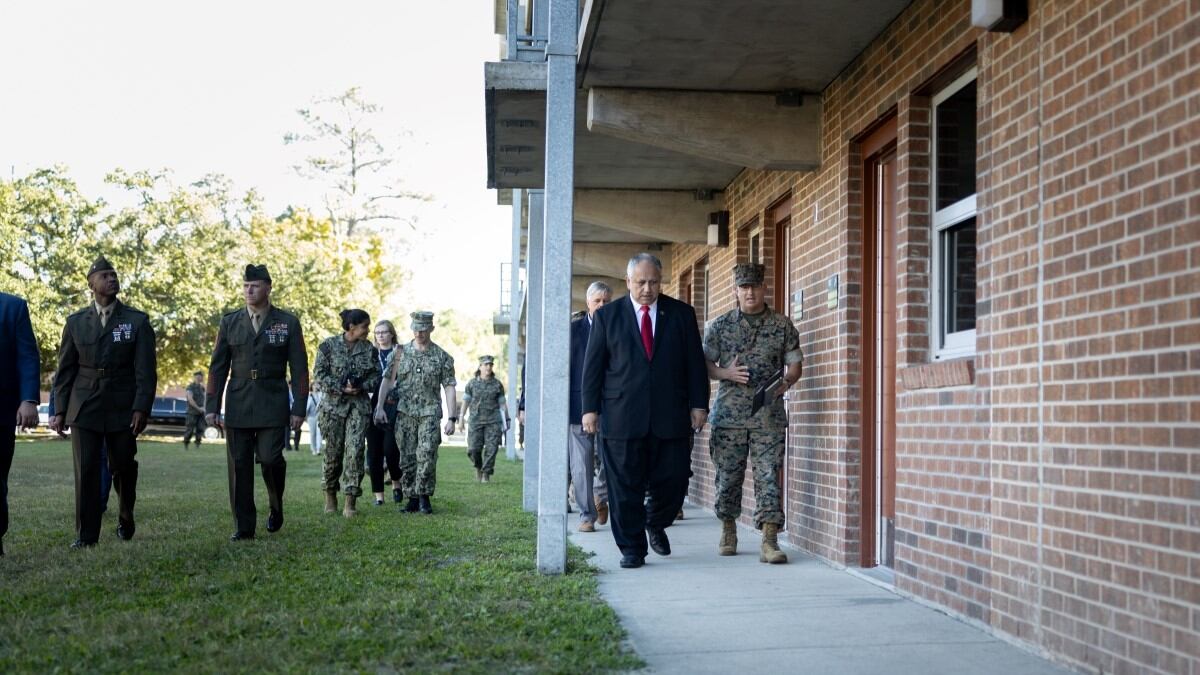Correction 12:30 p.m. Friday: This story and its headline have been updated to reflect that, according to Marine spokesman Maj. Joshua Pena, School of Infantry-East closed the shower facility before the video of it was filmed. Due to an inaccuracy in Pena’s previous statements, an earlier version of this story misstated the timeline of the shower facility being closed relative to the video being filmed.
The Marine Corps has sent in a health inspector and permanently closed off a shower facility on a North Carolina base where a social media video showed apparent mold on the ceiling.
A video posted to Instagram by the account @notinregz on or around Wednesday shows portions of the ceiling of a Camp Geiger, North Carolina, facility almost entirely coated in what appears to be black mold.
“Goddamn,” one Marine says.
The problem in the shower facility was attributed on Tuesday to a faulty air conditioning unit by Maj. Joshua Pena, a spokesman for Marine Corps Training and Education Command.
The building containing those showers already was set to be fully renovated in fiscal year 2024, and the shower facility will be closed until then, Pena said.
Camp Geiger, part of the Camp Lejeune, North Carolina, complex, is home to School of Infantry–East, where all new Marines from the eastern half of the country get combat training.
Meanwhile, a crew has been sent to clean up the area, and a health professional is conducting an inspection, Pena said. Marines are using an alternative location to shower, according to the spokesman.
“The facility that was in the video had been quarantined off prior to the filming of the video,” Pena said Friday. “Students had received the guidance before that to use alternative facilities.”
Pena encouraged Marines to report any issues they see in the places they live, because “the safety and health of Marines is always going to matter.”
“If you see something, say something, so that the command can take action,” Pena said.
Military.com first reported the closure of the facility.
Better barracks?
Providing decent living spaces to troops has been a persistent challenge for the military as a whole.
In August 2022, the Army base Fort Bragg, North Carolina, relocated nearly 1,200 soldiers from 50-year-old barracks that had become unlivable, in part because of high moisture levels that made it easy for mold to grow. A visit by the top enlisted soldier to the base, now known as Fort Liberty, prompted that relocation.
A Navy Times investigation in February 2022 revealed sailors at Naval Support Activity Bethesda, Maryland, were living in barracks that lacked hot water, air conditioning and locking doors.
A September report by the Government Accountability Office found the military’s barracks were plagued by mold, bad plumbing, and inadequate heating and cooling. Many Marines and sailors said they were dissatisfied with barracks maintenance teams for being slow or unresponsive.
RELATED

The Marine Corps has acknowledged its barracks need work and may pose a barrier to retaining Marines.
Officially speaking, Marines are entitled to barracks that meet health, environmental and safety standards, with “functional fixtures, furnishings, appliances, and utilities” and “common areas and amenities that are enjoyable.”
Commandant Gen. Eric Smith, the top Marine officer, and Sgt. Maj. Carlos Ruiz, the top enlisted Marine, looked at Camp Lejeune’s barracks during an October visit to the North Carolina and found many of them came up short.
The average Marine barracks is 32 years old, and some are in their 40s, Smith said there, according to a video he posted on Instagram.
“We want our Marines to be taken care of,” Smith said. “It’s a safety issue.”
Smith told reporters Oct. 27 — two days before the cardiac arrest that has sidelined him from the office of commandant while he recovers — that he was asking Congress for additional money to revamp and construct barracks. The Marine Corps already was working to install more air conditioning units, he said.
Since the average occupancy of barracks is around 60%, the Corps will consolidate Marines into the best of the barracks, even if that means mixing Marines from different units, according to Smith.
Smith also plans to put in place more professional barracks managers, rather than making keeping tabs on barracks the responsibility of certain young Marines.
But it will take the Marine Corps approximately 10 years to resolve its barracks problems, the commandant predicted.
Irene Loewenson is a staff reporter for Marine Corps Times. She joined Military Times as an editorial fellow in August 2022. She is a graduate of Williams College, where she was the editor-in-chief of the student newspaper.





